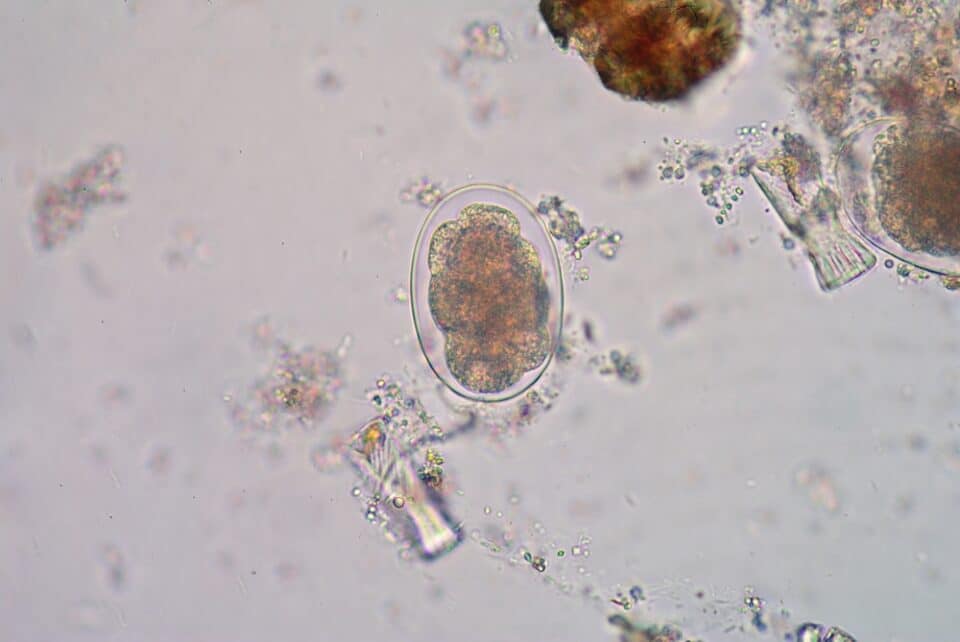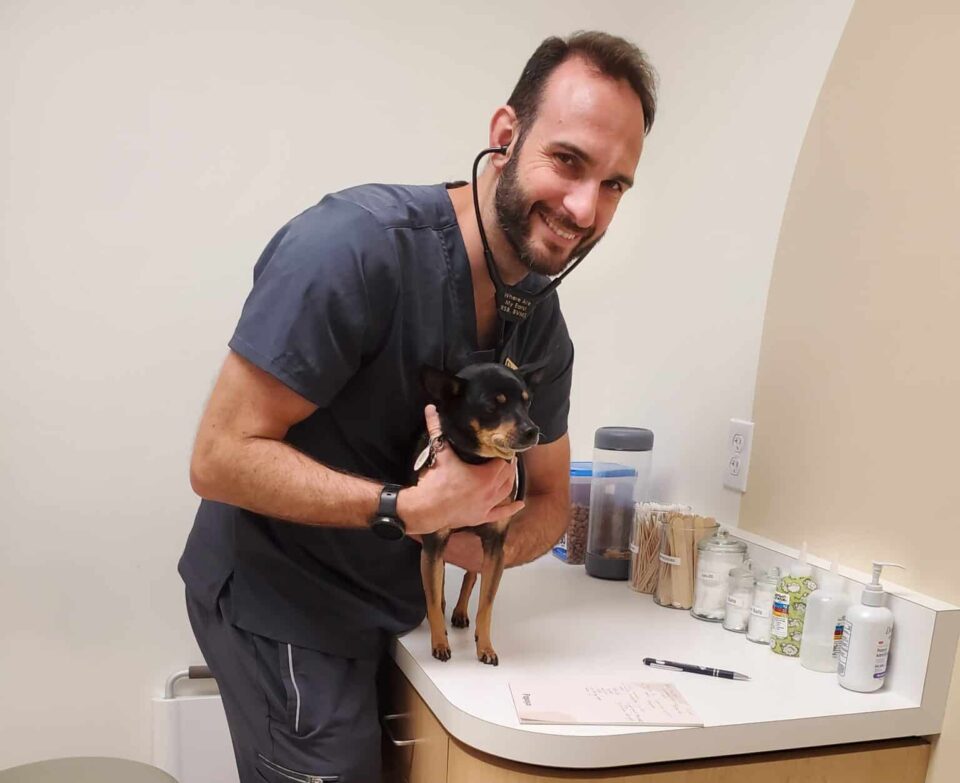Pet Care
5 min read
How to Protect Your Pet from Intestinal Parasites
Published on Nov 25, 2023

We all know that pets are not just animals; they are cherished members of the family, so ensuring their well-being is a top priority for any pet owner. One aspect of pet health that often goes overlooked is the threat posed by intestinal parasites. These tiny invaders can wreak havoc on your pet’s health, causing discomfort and, in severe cases, leading to serious illnesses.
Understanding the types of intestinal parasites in dogs and cats is crucial for navigating the murky waters of pet illness. In this guide, we’ll delve into the world of intestinal parasites, exploring their life cycles, symptoms, detection methods, treatment options, and preventive measures.
Types of Intestinal Parasites in Dogs
Hookworms in Dogs
Let’s kick things off by talking about sneaky hookworms. These intestinal worms can be a real headache for your pet. They latch onto your pet’s small intestine and suck their blood, causing internal blood loss. The life cycle of a hookworm involves various stages, from egg to larvae to adult. Symptoms of hookworm infection may include anemia, diarrhea, and weight loss.1 Regular veterinary check-ups can aid in early detection.
Hookworm treatment usually involves deworming medications, but parasite prevention is equally vital. Keeping your dog’s living area clean and avoiding contact with contaminated soil or dog poop can significantly reduce the risk of hookworm infection.
Roundworms in Dogs
Now, let’s round up some information on roundworms. These spaghetti-like parasites can be found in the intestines of dogs. Symptoms may range from vomiting to a pot-bellied appearance in severe cases, and diagnosis often involves identifying worm eggs in dog stool.1
Like treating hookworms, roundworm treatment typically consists of deworming medications, but it’s essential to discuss the best approach with your veterinarian. Regular check-ups help monitor your dog’s health and catch any signs of roundworm infection early on.
Tapeworms in Dogs
Moving on to tapeworms – those segmented troublemakers. These parasites can latch onto your dog’s intestines and cause discomfort. Symptoms may include scooting, visible tapeworm segments in the feces, or irritation around the anus.
Effective treatments for these intestinal worms often include deworming medications prescribed by your vet, but preventive measures involve flea and tick prevention since tapeworms often hitch a ride on fleas.2 Maintaining a flea-free environment is a key strategy to keep these internal parasites at bay.
Importance of Timely Detection
Detecting intestinal parasites early is like putting up a shield against potential health issues. Regular veterinary check-ups play a crucial role in identifying and addressing any signs of infection before they escalate. Keep a close eye on changes in your pet’s behavior, feces, or weight, as these could be indicators of an underlying issue.
Comparative Analysis of Treatment Options
In the realm of treating intestinal parasites, a variety of options exist. Here’s a quick rundown:
- Conventional Medications: Prescription medications can effectively eliminate dog parasites. Be sure to choose a medication recommended by veterinarians for targeted treatment.
- Holistic Approaches: Natural remedies, like probiotics and digestive enzymes, and dietary changes offer alternative paths to veterinary medicine. Considered for a more holistic and balanced approach to pet health.
- Combination Therapies: Try integrating conventional and holistic methods for comprehensive care. This strikes the balance between medical efficacy and holistic well-being for your dog.
- Ongoing Monitoring: Regular veterinary check-ups help monitor treatment effectiveness. Be sure to adjust the treatment plan based on your pet’s response.
Navigating these treatment options in consultation with your veterinarian ensures a thoughtful and effective approach to combating intestinal parasites in your furry companions.
Tips for Prevention
Prevention is the best medicine when it comes to intestinal parasites. Here are some practical tips for dog owners:
- Maintain a Clean Living Environment: Regularly clean and disinfect your pet’s living area to minimize the risk of parasite contamination.1
- Practice Good Hygiene: Wash your hands thoroughly after handling your pet, especially after cleaning up feces.
- Regular Vet Check-ups: Schedule routine veterinary check-ups to catch any potential issues early on.
- Flea Control Medication: Since fleas can transmit certain types of parasites, investing in flea control measures is crucial. A vet tip from our Papaya Vet team for preventing fleas is to give your dog products like Simparica Trio since it guards against roundworms and hookworms. It’s a chewable tablet that is easy to give.
Types of Intestinal Parasites in Cats
Hookworms in Cats
Cats are not immune to the charms of hookworms either. Like those found in dogs, these blood-sucking internal parasites can cause anemia and gastrointestinal issues in our feline friends.3 Prevention involves keeping your cat indoors and maintaining a clean litter box.
Roundworms in Cats
Roundworms in cats can lead to vomiting, diarrhea, and a distended abdomen.3 Regular deworming and maintaining good hygiene practices can help prevent roundworm infestations.
Tapeworms in Cats
Tapeworms in cats often result from ingesting infected fleas. Regular flea control and routine vet check-ups are essential to keep this common intestinal parasite at bay.
Combating an Intestinal Parasite Infection
In the pursuit of safeguarding your beloved pets from the threat of intestinal parasites, knowledge, and proactive measures play pivotal roles. As you embark on this journey, remember that a well-informed approach, incorporating preventive measures and regular veterinary care, ensures a vibrant and joyful life for your furry family members.
At Papaya Veterinary Care, we understand the importance of comprehensive pet health. Our range of products includes innovative solutions designed to treat intestinal parasite infections effectively. From pet bloodwork that tests for intestinal parasites to microchipping services to annual pet exams, Papaya Vet Care offers a holistic approach to pet care, empowering you to make informed choices for your cherished companions. Trust Papaya Vet Care to be your ally in the ongoing quest for your pet’s well-being. Together, we can create a parasite-free environment, allowing your pets to thrive and continue bringing boundless joy to your family.
Sources:
- PetMD. How to Get Rid of Worms in Dogs. https://www.petmd.com/dog/general-health/evr_dg_intestinal_worms_in_dogs
- American Kennel Club. Tapeworms in Dogs: Symptoms, Treatment, and Prevention. https://www.akc.org/expert-advice/health/tapeworms-in-dogs-symptoms-treatment-and-prevention/
- PetMD. How to Get Rid of Worms in Cats. https://www.petmd.com/cat/parasites/worms-cats-everything-you-need-know














